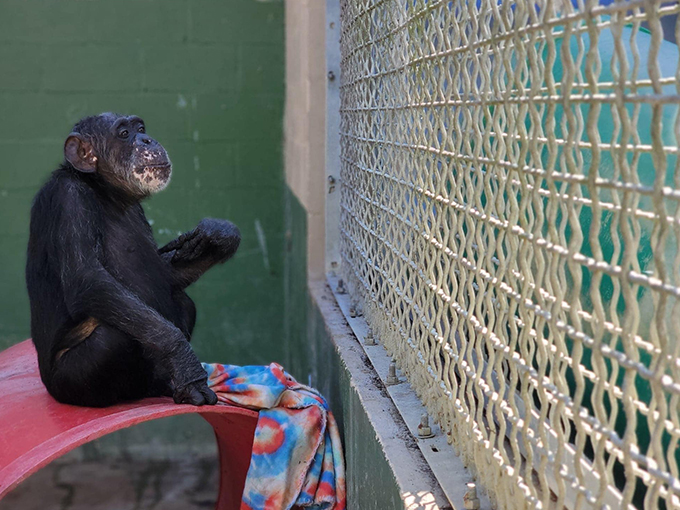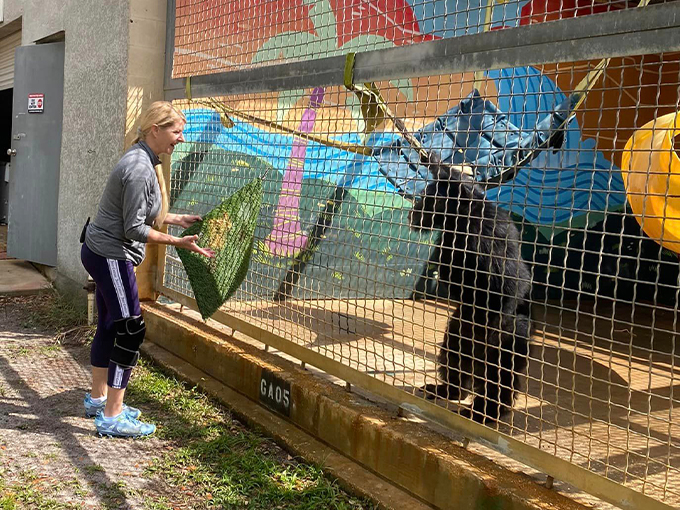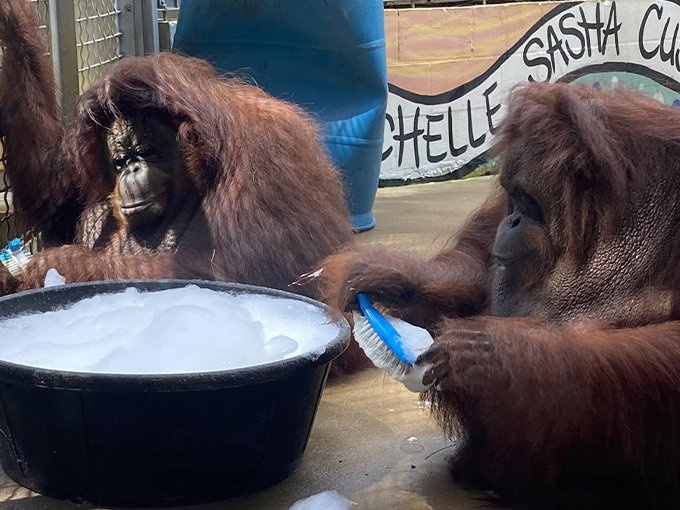When it comes to animal welfare and conservation, the Suncoast Primate Sanctuary stands as a beacon of hope for primates in need. Located in Wimauma, Florida, this sanctuary offers a safe haven for primates that have been rescued from various challenging circumstances. It serves not only as a refuge but also as a symbol of compassion and dedication to animal rights.
The sanctuary has been at the forefront of efforts to provide a nurturing environment for primates, ensuring they receive the care and attention they deserve. With its expansive grounds and dedicated staff, Suncoast Primate Sanctuary has become a trusted name in the world of wildlife conservation.
As awareness about animal welfare grows, Suncoast Primate Sanctuary continues to play a vital role in educating the public about the importance of protecting primates. Through its programs and initiatives, the sanctuary strives to create a better future for these magnificent creatures.
Read also:Caius Farm Brewery Your Ultimate Guide To Sustainable Craft Beer
Table of Contents
- The History of Suncoast Primate Sanctuary
- Mission and Vision
- Rescue and Rehabilitation Efforts
- Species of Primates at the Sanctuary
- Educational Programs and Outreach
- How to Donate and Support
- Volunteering Opportunities
- The Impact of the Sanctuary
- Future Plans and Goals
- Conclusion
The History of Suncoast Primate Sanctuary
Established in 1993, Suncoast Primate Sanctuary has a rich history rooted in compassion and commitment to primates. The sanctuary was founded by Dr. Vicki Gray, a veterinarian with a deep passion for wildlife conservation. From its humble beginnings, the sanctuary has grown into a renowned institution dedicated to rescuing and rehabilitating primates.
Dr. Gray's vision was to create a place where primates could live freely and safely, away from the dangers of exploitation and abuse. Over the years, the sanctuary has expanded its facilities and programs, allowing it to accommodate more animals and provide them with the highest level of care.
Founding Vision and Growth
The founding vision of Suncoast Primate Sanctuary was to address the growing issue of primate neglect and mistreatment. Initially, the sanctuary focused on rescuing primates from the pet trade and research facilities. As its reputation grew, it began receiving primates from zoos and other sanctuaries that could no longer care for them.
Today, the sanctuary spans over 60 acres, providing ample space for the primates to roam and interact in a natural environment. The growth of the sanctuary has been driven by the increasing awareness of animal welfare issues and the need for safe havens for endangered species.
Mission and Vision
The mission of Suncoast Primate Sanctuary is to provide a safe and enriching environment for primates in need. The sanctuary aims to rescue, rehabilitate, and care for primates that have been mistreated, neglected, or abandoned. Through its programs, it also seeks to educate the public about the importance of primate conservation and the ethical treatment of animals.
The vision of the sanctuary is to create a world where primates are treated with respect and dignity, and where their habitats are protected from destruction. By promoting awareness and encouraging action, the sanctuary hopes to inspire others to join the fight for animal rights.
Read also:Teamsters Local 25 A Comprehensive Guide To One Of Americas Strongest Labor Unions
Core Values
- Compassion: Treating all animals with kindness and empathy.
- Integrity: Upholding ethical standards in all operations.
- Education: Informing the public about primate conservation.
Rescue and Rehabilitation Efforts
One of the primary functions of Suncoast Primate Sanctuary is its rescue and rehabilitation efforts. The sanctuary works tirelessly to rescue primates from various challenging situations, including the pet trade, research facilities, and substandard zoos. Each primate that arrives at the sanctuary undergoes a thorough evaluation and receives personalized care to address its specific needs.
Rehabilitation is a crucial aspect of the sanctuary's work. Primates that have suffered from neglect or abuse often require extensive physical and psychological care. The sanctuary employs a team of veterinarians, animal behaviorists, and caretakers who work together to ensure the primates' well-being.
Steps in the Rescue Process
- Assessment: Evaluating the health and condition of the primate.
- Treatment: Providing necessary medical care and rehabilitation.
- Acclimatization: Introducing the primate to its new environment.
Species of Primates at the Sanctuary
Suncoast Primate Sanctuary is home to a diverse range of primate species, each with its unique characteristics and needs. The sanctuary houses over 200 primates, including chimpanzees, gibbons, lemurs, and capuchin monkeys. Each species is provided with a habitat that mimics its natural environment, ensuring their comfort and well-being.
The sanctuary's commitment to biodiversity is evident in its efforts to care for a wide variety of primates. By providing a safe haven for these animals, the sanctuary plays a vital role in preserving their genetic diversity and preventing their extinction.
Notable Species
- Chimpanzees: Known for their intelligence and social behavior.
- Gibbons: Renowned for their acrobatic abilities and vocalizations.
- Lemurs: Distinctive for their large eyes and unique adaptations.
Educational Programs and Outreach
Suncoast Primate Sanctuary places a strong emphasis on education and outreach. The sanctuary offers a range of programs designed to inform the public about primate conservation and the importance of protecting wildlife. These programs include guided tours, workshops, and educational materials that cater to various age groups and interests.
The sanctuary also collaborates with schools, universities, and community organizations to promote awareness and encourage action. Through its outreach efforts, Suncoast Primate Sanctuary aims to inspire the next generation of conservationists and advocates for animal rights.
Key Educational Initiatives
- Tours: Guided tours of the sanctuary for visitors.
- Workshops: Interactive sessions for students and educators.
- Materials: Educational resources available online and in print.
How to Donate and Support
Supporting Suncoast Primate Sanctuary is crucial for its continued success in rescuing and caring for primates. The sanctuary relies on donations from individuals, businesses, and organizations to fund its operations and programs. There are several ways to contribute, including monetary donations, sponsorships, and in-kind contributions.
Donations can be made through the sanctuary's website, where supporters can choose to make a one-time or recurring gift. In addition to financial contributions, the sanctuary accepts donations of supplies, such as food, enrichment items, and medical supplies, that are essential for the care of the primates.
Ways to Donate
- Monetary Donations: Support the sanctuary's operations and programs.
- Sponsorships: Sponsor a specific primate or program.
- In-Kind Contributions: Donate supplies and resources.
Volunteering Opportunities
Volunteering at Suncoast Primate Sanctuary is a rewarding experience for those passionate about animal welfare and conservation. The sanctuary offers various volunteer opportunities, allowing individuals to contribute their time and skills to support the primates' care and the sanctuary's mission.
Volunteers assist with daily tasks such as feeding the primates, maintaining their habitats, and participating in educational programs. The sanctuary also provides training and guidance to ensure volunteers are equipped to handle their responsibilities effectively.
Volunteer Roles
- Caretaker: Assist with the daily care of the primates.
- Educator: Help with educational programs and outreach.
- Administrator: Support administrative tasks and operations.
The Impact of the Sanctuary
The impact of Suncoast Primate Sanctuary extends beyond its immediate community, reaching a global audience through its efforts in primate conservation and education. The sanctuary's work has resulted in significant improvements in the lives of the primates it rescues, providing them with a second chance at a happy and healthy life.
Through its educational programs and outreach efforts, the sanctuary has raised awareness about the importance of protecting primates and their habitats. Its impact is felt not only by the animals it cares for but also by the people it inspires to take action for animal rights.
Measuring Success
- Rescue Numbers: Over 200 primates have been rescued and cared for.
- Community Engagement: Thousands of visitors and volunteers participate annually.
- Conservation Efforts: Contributions to global primate conservation initiatives.
Future Plans and Goals
Suncoast Primate Sanctuary has ambitious plans for the future, aiming to expand its facilities and programs to accommodate more primates and reach a wider audience. The sanctuary is currently working on developing new habitats and enrichment programs to enhance the primates' quality of life.
In addition to its expansion plans, the sanctuary is committed to increasing its educational outreach efforts. By leveraging technology and digital platforms, it hopes to engage more people in its mission and inspire them to join the fight for primate conservation.
Strategic Goals
- Expansion: Increase the sanctuary's capacity to rescue and care for primates.
- Technology: Utilize digital tools to enhance educational programs.
- Collaboration: Partner with organizations to promote primate conservation.
Conclusion
Suncoast Primate Sanctuary is a vital institution in the world of animal welfare and conservation. Through its dedication to rescuing and rehabilitating primates, the sanctuary has made a significant impact on the lives of these magnificent creatures. Its commitment to education and outreach has also played a crucial role in raising awareness about the importance of protecting primates and their habitats.
We invite you to support Suncoast Primate Sanctuary by donating, volunteering, or spreading the word about its mission. Together, we can make a difference in the lives of primates and ensure a brighter future for these incredible animals. Share this article with your friends and family, and encourage them to join the cause for animal rights and conservation.


